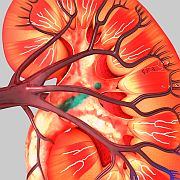CKD, which is mainly defined by laboratory abnormalities, is a suitable EHR phenotype
FRIDAY, June 26, 2015 (HealthDay News) — Chronic kidney disease (CKD) could be used as a model for improving chronic disease care using electronic health records (EHRs), according to a report published online June 25 in the Clinical Journal of the American Society of Nephrology.
Paul E. Drawz, M.D., M.H.S., from the University of Minnesota in Minneapolis, and colleagues identified general strategies for using EHRs to improve care for patients with CKD.
The researchers note that CKD is common in the United States, with significant room for improvement in CKD detection and management. CKD and associated conditions are mainly defined by objective laboratory data, and care requires collaboration by a diverse team of health care professionals. Improved access to CKD data would enable identification of high-risk patients. Strategies and goals for appropriate incorporation of CKD-related data into EHRs and associated design features should facilitate optimal care of CKD patients through improved access to clinical information and decision support; enhanced population management capabilities leading to clinical quality improvement; improvement of public health through wider availability of population-level CKD data via CKD surveillance; and research to improve CKD management via efficiencies in study recruitment and data collection.
“Although these strategies may be most effectively applied in the setting of CKD, because it is primarily defined by laboratory abnormalities and is therefore an ideal computable EHR phenotype, they may also apply to other chronic diseases,” the authors write.
Copyright © 2015 HealthDay. All rights reserved.








